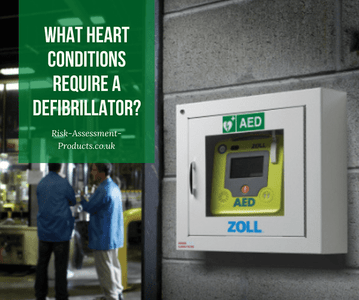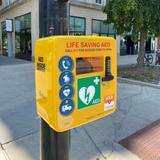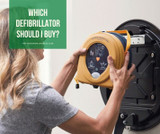What heart conditions require a defibrillator?
Defibrillators work by shocking the heart so that it can resume beating at it’s normal pace when someone has fallen ill. There are a number of conditions that can cause the heart to beat to slowly, too fast or irregularly and that subsequently require a defibrillator.
How do defibrillators work?
Defibrillators work by scanning the heart to determine whether a shock needs to be delivered or not. Once electrode pads are placed on the chest, the defibrillator begins the scanning process and if you are using an automatic defibrillator, it will administer the shock for you where as if you have a semi-automatic defibrillator, it will alert you to push a button for the shock to be delivered.
A defibrillator will only ever deliver a shock if one is needed and once this happens, the aim is for the heart to begin beating once again at it’s natural pace. When a cardiac arrest occurs, you must act fast as the heart is no longer pumping oxygenated blood around the body and to the brain. Delayed reaction can mean the difference between life and death.
Heart conditions:
There are a number of heart conditions that may mean you could require a defibrillator or be more at risk of needing one in your lifetime. Some heart conditions may be hereditary, some may be down to lifestyle and other genetics but, knowing about them before hand can help you manage your heart condition in the safest way possible.
- Coronary artery disease - when the arteries become clogged with cholesterol and other fatty deposits which reduce blood flow to the heart.
- Heart attack - these usually occur as a result of severe coronary artery disease. It can then trigger ventricular fibrillation and a sudden cardiac arrest. Heart attacks can also leave scar tissue on your heart resulting in abnormalities to your heart’s rhythm.
- Enlarged heart (cardiomyopathy) - when the heart’s muscular walls stretch or thicken meaning your hearts structure is abnormal, potentially leading to arrhythmia (an irregular heat beat)
- Valvular heart disease - this is the narrowing of the heart valves. This can lead to the stretching or thickening of the heart muscle. When the heart’s chambers become enlarged or weakened due to stress from a tight or leaking valve, the risk of developing an arrhythmia increases.
- Congenital heart disease - if a sudden cardiac arrest occurs in children or adolescents it can be due to a congenital heart disease. This is an encompassing phrase that covers a range of heart defects with 1 in 100 babies in the UK being born with one.
- Electrical problems in the heart - instead of issues with the muscles or valves, some people have problems with the electrical system within the heart. Conditions include Brugada syndrome and long QT syndrome.
Risk factors
- Sudden cardiac arrests can happen to anyone at anytime. However, because cardiac arrests are often linked to coronary artery disease, there are some risk factors to consider, these include:
- obesity
- diabetes
- smoking
- an inactive lifestyle
- family history of coronary artery disease
- high blood pressure
- high cholesterol.
Additional factors that may also increase your risk of a sudden cardiac arrest are:
- obstructive sleep apnea
- Using illegal drugs
- getting older
- a previous heart attack
- chronic kidney disease
- family history of cardiac arrest
- being male
- nutritional imbalance e.g low magnesium or potassium.
Although of course, there are a number of risk factors that are unavoidable, there are things you can do avoid a sudden cardiac arrest such as maintaining a healthy lifestyle, keeping active and not smoking.
Defibrillators really do make the difference between life and death, it’s important to take note of the closest defibrillator to your home and work so if you are ever in an emergency, you know where to find one.
Recent Posts
-
Empowering Communities: The Lifesaving Impact of CPR on Restart a Heart Day
Every year, on and around October 16th, an important event takes place - Restart a Heart Day. This a …16th Oct 2023 -
Which home defibrillator?
80% of all out of hospital cardiac arrests occur at home. Defibrillators are often available in loca …4th Dec 2022 -
Which defibrillator should I buy?
There are many defibrillators available on the market and it can become overwhelming knowing which o …4th Nov 2022




